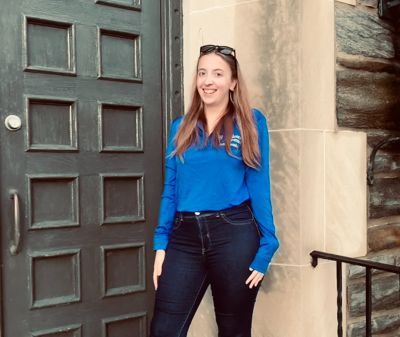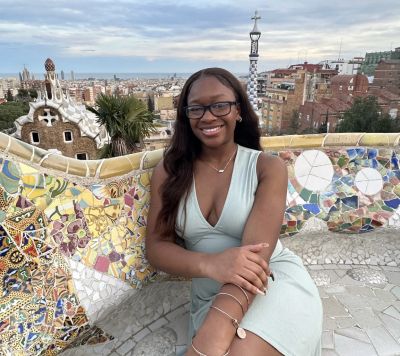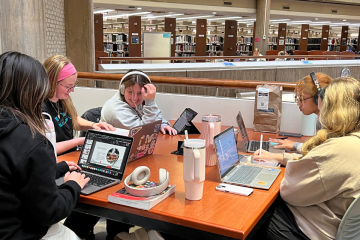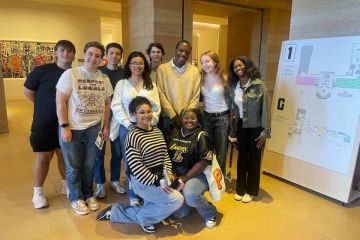How We Spent our Summer Vacation

From robotics and artificial intelligence to the impact of COVID on different demographics, the research and other work tackled by Widener undergraduates this past summer was as varied as it was timely and relevant.
More than 60 students partnered with faculty advisors through the annual Summer Undergraduate Research & Creative Activities (SURCA) program, which offers students from across academic disciplines the opportunity to apply what they’ve learned in the classroom to real-life, hands-on projects.
Students also learn how to talk about their projects and present in a professional setting, which they will do during the 14th annual SURCA Symposium on campus Sept. 22.
This summer, we caught up with a few of the SURCA participants to chat about their projects and what inspired their pursuits.
Local and Global Biodiversity
When most people think of an urban environment they don’t often think about reptiles and amphibians running around. Biology majors Luigi Quierolo ’25 and Alexa Ruberte ’25 set out to find them at the Taylor Arboretum, a 30-acre reserve located just a mile from Widener’s Chester Campus.
The pair, expanding on research by their faculty mentor Bruce Grant, chair of biology, spent the summer working at the arboretum to look at which reptile and amphibian species they could find. Using cover boards placed in strategic locations around the arboretum, Quierolo and Ruberte were hoping to see the impact of urbanization on species variety.
“There are urbanophobic reptiles and amphibians that won’t thrive in urban environments, but there are also urbanophilic species that do thrive, so it can be positive on those types,” Ruberte explained.
The idea stemmed from being partners in one of Grant’s classes where they were tasked with coming up with a research project idea. Quierolo, who had participated in SURCA before working with Associate Professor of Biology Kate Goodrich, encouraged Ruberte to join him in putting their project idea into practice.
Ruberte will present their findings from the arboretum at the 2023 SURCA Symposium, while Quierolo will focus his presentation on an addition to the project.
Using a site called iNaturalist, an online database of plants and animals from all over the world, the team has been analyzing reptile populations in and around various cities to further their research. Looking at data from many cities including Philadelphia, Los Angeles, and Quierolo’s home city of Lima, Peru, they are able to identify which reptile species may have moved due to urbanization in those areas.
“We scanned a 50 km [roughly 31 mile] range assuming the species went on the outlands of the main city because of urbanization,” Quierolo explained.
Ultimately, the team’s interest in reptiles and amphibians isn’t just for fun- it’s continuing to build insight into the biodiversity of a given location and how humans can have an impact on the wildlife that lives there.
Does a Scandinavian Prison Model Work in America?
Zoe Sweet ’25 never thought she would spend time in a prison interviewing incarcerated individuals. But after taking an English class with Associate Professor Jayne Thompson her freshman year, Sweet was intrigued and has been part of student-prisoner classes taught by Thompson ever since.
“I was a little worried. There are so many negative connotations embedded in your mind about prisons,” said Sweet, a political science and English major. “But all that went out the door. As you sit down with them, it’s amazing.”
For her SURCA project, Sweet turned her attentions to nearby State Correctional Institution (SCI) - Chester, which has transformed a section of its facility into “Little Scandinavia,” so named because it’s modeled after prisons in places like Sweden and Norway.
The men in Little Scandinavia are afforded certain amenities not available in the general population, including being housed in individual cells, having an open lobby area and their own kitchen to cook and buy food, and even eating with correctional officers, some of whom were trained in Scandinavian countries to implement this model.
“This type of wing allows them to be treated as humans and actually grow from their mistakes, so it can lead to rehabilitation and reentry and so they don’t re-offend. I hope this is the next step [for the American prison system],” said Sweet.
Sweet is interviewing those living and working in Little Scandinavia, and her goal is to publish her findings. An aspiring judge, the experience is proving invaluable for Sweet. Her previous work in prisons helped her land an internship as a criminal investigator for the Delaware County Public Defender’s Office, which she completed over the summer while doing SURCA.
“I want to help inmates from the very beginning,” said Sweet.
Advocating for Easier Access to Feminine Hygiene Products & Condoms
The inspiration for junior Ja’Lisa Williams’ SURCA project came after a trip to a bathroom at a conference.
Treasurer of Widener’s Residence Hall Association, Williams was attending a residence life conference at Kent State University in Ohio. There, in a bathroom on the campus, she spotted a feminine hygiene and condom dispenser, with free products available for anyone to take.
The marketing major immediately thought, “can we start that at Widener?”
Anecdotally, Williams understood the need: college students don’t always have money to purchase hygiene products like pads and tampons, or condoms; some are too shy or embarrassed to buy such items in a store; and members of the LGBTQ+ community may grapple with added concerns.
For her SURCA project, Williams began reviewing the literature and researching the issue, including why so many college students have unprotected sex. She is developing a survey for Widener’s campus, to gauge interest and possible usage of a bathroom dispenser.
Williams is working with various campus partners to gain their support for installing the dispensers. These partners include university administration, Student Health Services, Counseling and Psychological Services, the campus Food Pantry, and Student Government Association, of which Williams is vice president of the senate.
“No matter how much (feminine hygiene or sex) is talked about, we’re still uncomfortable. This is designed to get rid of that,” said Williams.
Mastering the Game with AI
When Nick Chaves ’24 was thinking about his summer research project idea, he was inspired by his own childhood playing Qwirkle, a tile-based game known for its bright colors, fun shapes, and sharp strategy. Chaves, a computer science major, took his childhood game and brought it to the college level by bringing in artificial intelligence (AI).
“I played the game growing up a lot,” said Chaves of his inspiration. “Also, it’s never been done before. I did a bunch of research, and I couldn’t find anything about people using AI to play and learn the game.”
The project began with the goal of creating an AI assistant for use when playing the game, but Chaves soon realized that he wasn’t certain of the best game play strategy to feed the program.
Working under the advisement of Edwin Dauber, assistant professor of computer science, Chaves has been building an AI aimed at learning – and winning – a game of Qwirkle using image recognition and simulated play.
“The user can take a photo of the game and the AI recognizes all of the piece tiles and the board configuration,” Chaves explained. “I’ve run simulations on a virtual board and the AI learns through self-play how to play the game. And the cool part is you don’t need to put in any prior knowledge into the AI. It develops its own strategy to play the game.”
His ultimate goal is to evolve this technology into an app or website, but the AI still has some learning to do under Chaves’ direction.
“The idea of making a Qwirkle AI is new, but the algorithms I’m using are very similar to ones that have been used before. The thing with AI is the longer you run simulations, the more tests you do, the better it gets,” he said.





